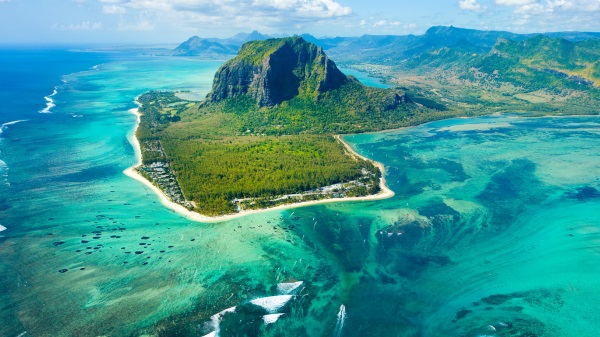Environment
Rising Seas Not Resulting in Disappearing Islands

From Heartland Daily News
A spate of recent articles acknowledges a fact that Climate Realism has long discussed. Most island nations, rather than sinking beneath the waves as seas rise amid modest warming, as predicted by climate alarmists and island profiteers, are, in fact growing.
Writing for The Pipeline, Buck Throckmorton thoroughly debunks claims that recent collapses of houses built on the shores of barrier islands in North Carolina were caused by climate change:
[B]arrier islands … are impermanent deposits of sand, which reshape, move, merge, appear, and disappear due to tides, winds, and storms.
The movement of barrier islands is not due to rising sea levels, it is due to a naturally occurring force called “longshore drift.” Where there are man-made efforts to stabilize barrier islands with jetties and sea walls, this produces other impacts on currents that cause erosion in some waterfront areas and new sand deposits in others. Beach houses in the Outer Banks are not being lost due to rising sea levels, they are being lost due to shifting sands.
Throckmorton also pointed to the disappearance of Tucker’s Island, off the coast of New Jersey, which completely disappeared due to “long-shore drift,” not rising seas.
NOAA describes the impact of long-shore drift, thusly:
Longshore drift may also create or destroy entire barrier islands along a shoreline. A barrier island is a long offshore deposit of sand situated parallel to the coast. As longshore drifts deposit, remove, and redeposit sand, barrier islands constantly change.
Semi-permanent, shifting barrier islands are not the only types of islands not being destroyed by climate change-induced rising seas. Even The New York Times (NYT) was recently forced by reality to admit that coral atolls, long the poster child of rising seas claiming nations, have been expanding and adding land amidst the Earth’s slight recent warming.
As recently as April 2024, with a story titled “Why Time Is Running Out Across the Maldives’ Lovely Little Islands,“ the NYT was still pushing the lie that rising seas threaten dozens of island nations, consisting of hundreds of small coral atolls, with extinction. Reality forced the NYT to reverse itself in the space of just three months. The author of a late June article, “A Surprising Climate Find,” wrote:
Of late, though, scientists have begun telling a surprising new story about these islands. By comparing mid-20th century aerial photos with recent satellite images, they’ve been able to see how the islands have evolved over time. What they found is startling: Even though sea levels have risen, many islands haven’t shrunk. Most, in fact, have been stable. Some have even grown.
The problem with this narrative is that the fact of growing islands during the recent period of climate change is not new news. In fact, as my colleague Linnea Lueken noted in a recent piece, the study the NYT references was published in 2018, six years ago. It found 89 percent of islands in the Pacific and Indian Oceans increased in area or were stable, and only 11 percent showed any sign of contracting.
Indeed, geological understanding of coral atoll growth and demise is not newly discovered.
“Scientists have known for decades, if not more than a hundred years, that atoll islands uniquely change with changing sea levels,” Lueken points out. “Charles Darwin was the first to propose that reefs were many thousands of feet thick, and grow upwards towards the light. He was partially correct, though reality is more complicated than his theory.”
Repeated studies show that what is true of the Maldives, growth amid rising seas, is equally true of the islands that make up Tuvalu and Kiribati, and across the island chains of Micronesia. One well-cited study from 2015 reported that 40 percent of islands in the Pacific and Indian Oceans were stable, and another 40 percent had grown, in recent decades.
Oceans, oceans everywhere, and nowhere can be found the much-bemoaned decline in island nations hyped be climate hucksters with regularity. When even the NYT is forced to admit this truth, you know the climate alarm narrative is in trouble.
Sources: The Pipeline; The New York Times; Climate Realism
Automotive
Politicians should be honest about environmental pros and cons of electric vehicles

From the Fraser Institute
By Annika Segelhorst and Elmira Aliakbari
According to Steven Guilbeault, former environment minister under Justin Trudeau and former member of Prime Minister Carney’s cabinet, “Switching to an electric vehicle is one of the most impactful things Canadians can do to help fight climate change.”
And the Carney government has only paused Trudeau’s electric vehicle (EV) sales mandate to conduct a “review” of the policy, despite industry pressure to scrap the policy altogether.
So clearly, according to policymakers in Ottawa, EVs are essentially “zero emission” and thus good for environment.
But is that true?
Clearly, EVs have some environmental advantages over traditional gasoline-powered vehicles. Unlike cars with engines that directly burn fossil fuels, EVs do not produce tailpipe emissions of pollutants such as nitrogen dioxide and carbon monoxide, and do not release greenhouse gases (GHGs) such as carbon dioxide. These benefits are real. But when you consider the entire lifecycle of an EV, the picture becomes much more complicated.
Unlike traditional gasoline-powered vehicles, battery-powered EVs and plug-in hybrids generate most of their GHG emissions before the vehicles roll off the assembly line. Compared with conventional gas-powered cars, EVs typically require more fossil fuel energy to manufacture, largely because to produce EVs batteries, producers require a variety of mined materials including cobalt, graphite, lithium, manganese and nickel, which all take lots of energy to extract and process. Once these raw materials are mined, processed and transported across often vast distances to manufacturing sites, they must be assembled into battery packs. Consequently, the manufacturing process of an EV—from the initial mining of materials to final assembly—produces twice the quantity of GHGs (on average) as the manufacturing process for a comparable gas-powered car.
Once an EV is on the road, its carbon footprint depends on how the electricity used to charge its battery is generated. According to a report from the Canada Energy Regulator (the federal agency responsible for overseeing oil, gas and electric utilities), in British Columbia, Manitoba, Quebec and Ontario, electricity is largely produced from low- or even zero-carbon sources such as hydro, so EVs in these provinces have a low level of “indirect” emissions.
However, in other provinces—particularly Alberta, Saskatchewan and Nova Scotia—electricity generation is more heavily reliant on fossil fuels such as coal and natural gas, so EVs produce much higher indirect emissions. And according to research from the University of Toronto, in coal-dependent U.S. states such as West Virginia, an EV can emit about 6 per cent more GHG emissions over its entire lifetime—from initial mining, manufacturing and charging to eventual disposal—than a gas-powered vehicle of the same size. This means that in regions with especially coal-dependent energy grids, EVs could impose more climate costs than benefits. Put simply, for an EV to help meaningfully reduce emissions while on the road, its electricity must come from low-carbon electricity sources—something that does not happen in certain areas of Canada and the United States.
Finally, even after an EV is off the road, it continues to produce emissions, mainly because of the battery. EV batteries contain components that are energy-intensive to extract but also notoriously challenging to recycle. While EV battery recycling technologies are still emerging, approximately 5 per cent of lithium-ion batteries, which are commonly used in EVs, are actually recycled worldwide. This means that most new EVs feature batteries with no recycled components—further weakening the environmental benefit of EVs.
So what’s the final analysis? The technology continues to evolve and therefore the calculations will continue to change. But right now, while electric vehicles clearly help reduce tailpipe emissions, they’re not necessarily “zero emission” vehicles. And after you consider the full lifecycle—manufacturing, charging, scrapping—a more accurate picture of their environmental impact comes into view.
Agriculture
Canada’s air quality among the best in the world

From the Fraser Institute
By Annika Segelhorst and Elmira Aliakbari
Canadians care about the environment and breathing clean air. In 2023, the share of Canadians concerned about the state of outdoor air quality was 7 in 10, according to survey results from Abacus Data. Yet Canada outperforms most comparable high-income countries on air quality, suggesting a gap between public perception and empirical reality. Overall, Canada ranks 8th for air quality among 31 high-income countries, according to our recent study published by the Fraser Institute.
A key determinant of air quality is the presence of tiny solid particles and liquid droplets floating in the air, known as particulates. The smallest of these particles, known as fine particulate matter, are especially hazardous, as they can penetrate deep into a person’s lungs, enter the blood stream and harm our health.
Exposure to fine particulate matter stems from both natural and human sources. Natural events such as wildfires, dust storms and volcanic eruptions can release particles into the air that can travel thousands of kilometres. Other sources of particulate pollution originate from human activities such as the combustion of fossil fuels in automobiles and during industrial processes.
The World Health Organization (WHO) and the Canadian Council of Ministers of the Environment (CCME) publish air quality guidelines related to health, which we used to measure and rank 31 high-income countries on air quality.
Using data from 2022 (the latest year of consistently available data), our study assessed air quality based on three measures related to particulate pollution: (1) average exposure, (2) share of the population at risk, and (3) estimated health impacts.
The first measure, average exposure, reflects the average level of outdoor particle pollution people are exposed to over a year. Among 31 high-income countries, Canadians had the 5th-lowest average exposure to particulate pollution.
Next, the study considered the proportion of each country’s population that experienced an annual average level of fine particle pollution greater than the WHO’s air quality guideline. Only 2 per cent of Canadians were exposed to fine particle pollution levels exceeding the WHO guideline for annual exposure, ranking 9th of 31 countries. In other words, 98 per cent of Canadians were not exposed to fine particulate pollution levels exceeding health guidelines.
Finally, the study reviewed estimates of illness and mortality associated with fine particle pollution in each country. Canada had the fifth-lowest estimated death and illness burden due to fine particle pollution.
Taken together, the results show that Canada stands out as a global leader on clean air, ranking 8th overall for air quality among high-income countries.
Canada’s record underscores both the progress made in achieving cleaner air and the quality of life our clean air supports.
-

 Daily Caller2 days ago
Daily Caller2 days ago‘Almost Sounds Made Up’: Jeffrey Epstein Was Bill Clinton Plus-One At Moroccan King’s Wedding, Per Report
-

 Business15 hours ago
Business15 hours agoArgentina’s Milei delivers results free-market critics said wouldn’t work
-

 Alberta2 days ago
Alberta2 days agoHousing in Calgary and Edmonton remains expensive but more affordable than other cities
-

 Business1 day ago
Business1 day agoState of the Canadian Economy: Number of publicly listed companies in Canada down 32.7% since 2010
-

 International1 day ago
International1 day agoDOJ fails to fully comply with Friday deadline for Epstein files release
-

 Bruce Dowbiggin1 day ago
Bruce Dowbiggin1 day agoHunting Poilievre Covers For Upcoming Demographic Collapse After Boomers
-

 Business2 days ago
Business2 days agoTrump signs order reclassifying marijuana as Schedule III drug
-

 Crime2 days ago
Crime2 days agoBrown University shooter dead of apparent self-inflicted gunshot wound





